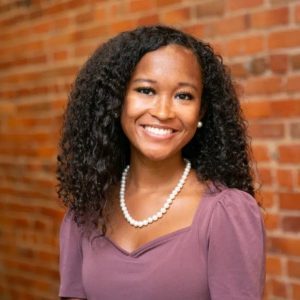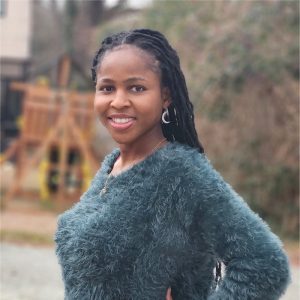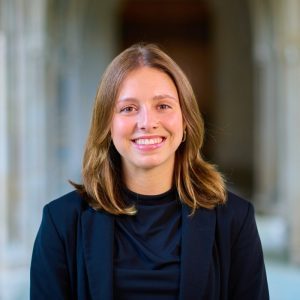Before joining LILE as our Assistant Vice Provost for Faculty Development and Applied Research, Aria Chernik served with Jan Riggsbee as the faculty lead for the innovative project described in this post. Hello, Ethi{CS}: Co-Designing Ethics-Centered Computational Education to Broaden Participation in College and Career Readiness is generously supported by funding from The Duke Endowment, the Office of Durham & Community Affairs, the School of Medicine, and the School of Nursing.
By Ryan Ravanpak and Faith Lowery
Duke University’s Hello, Ethi{CS} project is an innovative collaboration between Duke undergraduate student fellows and Duke TeachHouse educator fellows to bridge the equity, ethics, and K-12 computer science education gap in Durham public school classrooms. By integrating ethics-centered computing skills into curricula that acknowledge and build upon students’ diverse lived experiences, Hello, Ethi{CS} seeks to make computer science education more accessible, culturally relevant, and supportive for all learners. The program leverages the computer science content knowledge of Duke student fellows and the pedagogical experience of Durham educators to co-create lesson plans that embed ethical considerations into computing fundamentals. The voices of the program’s undergraduate student and teacher participants illuminate the transformative potential of a co-creative model for ethics-driven, equity-focused K-12 computer science education.
Reagan Razon, Duke Student Fellow

As a Computer Science major with a Certificate in Child Policy Research, Reagan has long been interested in the intersections of early education, STEM, and ethics. Growing up in North Carolina and attending Wake County schools, she is motivated by her desire to give back to the same education system that first ignited her passion for learning.
Reagan has always sought ways to make learning inclusive and equitable, from participating in after-school programs to mentoring students. Hello, Ethi{CS} serves as a culmination of these efforts, providing a platform for Reagan to pursue her dream of creating an innovative educational space that is welcoming to all.
“When it comes to computing education, often people think about ethics in terms of ethical design,” she says, “but I think it’s also important to zoom out and think of equity at every step of education.”
Reagan emphasizes that Hello, Ethi{CS} confronts the challenge of changing not only what is taught (through incorporating ethics in lesson plans) but how it is taught (through project-based, student-centered learning). She inquires: “Are the programs we’re making able to be accessed by everyone? And then, once we implement them, are we making sure that students are retained in the programs, and are they being supported?”
To Reagan, embedding ethics into computing education is not just about expanding the curriculum; it is about redefining it to include normative considerations naturally. Embedding ethics means making programs accessible, ensuring students feel supported, and aligning the curriculum with cultural relevance.
Reagan points out that one obstacle to expanding interest in STEM amongst more diverse populations is that many students have a narrow view of what a computer scientist does. “When you ask a lot of students what a computer scientist is…Someone will say, oh, it’s a guy sitting at a table, or it’s a person with bags under their eyes, who’s typing all day […], but there’s a lot more to computer science than that,” Reagan notes. “Being able to show students that you can create a fashion app, or you can use computer science to solve healthcare problems and relate it to their interests, and what they encounter daily also brings them in more.”
Furthermore, Reagan emphasizes the importance of considering students’ backgrounds when developing a curriculum. “Especially with students of color, it’s even more imperative to be mindful about our lived histories when making a curriculum because sometimes it can feel like things are very detached. And once the student feels detached, they won’t want to continue with CS,” she says.
One of the most empowering aspects of participating in Hello, Ethi{CS} thus far for Reagan has been forming co-collaborative partnerships with the Duke TeachHouse fellows. Reagan grasped the importance of flexibility by working with teachers from diverse backgrounds and fostering interdisciplinary connections between computing and other subjects like History and English. She learned how to adapt creatively to state curriculum constraints and pushback from stakeholders.
As Reagan moves forward with the Hello, Ethi{CS} project, she contends that truly equitable education requires deeply understanding students’ viewpoints. To achieve this, she asserts: know your students well, weave their experiences into your teaching, and ensure that equity and ethics are integral to your educational philosophy.
Onyinyechi Egwim, Professional Learning and Research Community (PLRC)
Duke TeachHouse Fellow | Maureen Joy Charter School, Grade 8, Subject: ELA

Hailing from Nigeria, Onyinyechi Egwim’s sixth-grade teacher – whose kindness, care, and mentorship transcended the conventional roles of an educator – inspired her journey to education. Onyinyechi’s elementary school teacher wasn’t just a facilitator of learning; she was a mentor, a guardian, and a source of unconditional support, embodying the qualities that transform a learning environment from a space of academic pursuit to a haven of safety and personal growth. This impactful figure continues igniting Onyinyechi’s passion for teaching, despite the physical and temporal distance between them.
Following her undergraduate education at the University of Nigeria, Onyinyechi pursued her Master’s in Education at Duke, where she now participates as a TeachHouse fellow. Transitioning into the American education system presented challenges, notably the stark differences in teacher-student interactions. Where once there was freedom to offer holistic support to students beyond the academic sphere, substantial restrictions now dictate the boundaries of these interactions, highlighting a cultural shift that has been both difficult and eye-opening.
Despite these adversities, Onyinyechi’s commitment to making a difference has never wavered. Her involvement in the Hello, Ethi{CS} project exemplifies this dedication. She strives to equip her students with the critical 21st-century skills necessary for navigating the digital world by advocating for equitable access to technology and differentiated learning. “One of my motivations is to find other ways to ensure that my students can get all of these 21st-century skills related to tech,” she says. Onyinyechi believes in the power of technology to democratize education and provide every student with the tools to succeed, regardless of their background.
For Onyinyechi, integrating personal experiences into education is not just a teaching strategy; it’s a powerful tool for deepening understanding and making learning relevant to students’ lives. She eloquently said, “Being able to integrate students’ experience helps for easier understanding… It’s essential to relate tech to students’ experience.” By tailoring educational content to students’ real-world experiences, educators can bridge the gap between theoretical concepts and practical application, making lessons more engaging and meaningful.
Incorporating an ethically sensitive tech curriculum into an 8th-grade English Language Arts (ELA) class presents unique challenges, demanding both innovation and a deep understanding of students’ diverse needs. This endeavor requires creativity and a commitment to personalized education. As Onyinyechi shares, “What I’m most excited about is creating. I love creating a curriculum and using creativity to differentiate lessons and ensure that each student can work at their own comfort.” Educators today must navigate the complex terrain of blending traditional literacy with digital fluency while considering the ethical dilemmas technology brings to the classroom.
Galen Phillips, Professional Learning and Research Community (PLRC)
Duke TeachHouse Fellow | Southern High School, Grades 9-12, Subject: World History, Sociology, Economics and Personal Finance

From the Pacific Northwest to Ethiopia, Professional Learning and Research fellow Galen Phillips has had a rather multifaceted set of experiences leading up to his involvement with Hello, Ethi{CS}. After acquiring a Bachelor of Art from the University of Oregon in History, Galen joined the Peace Corps– living in Ethiopia for a year and teaching English to 11th graders.
“That’s when my interest in teaching really solidified,” he recounts. When the COVID-19 pandemic hit, however, Galen was forced to leave Ethiopia. He decided to continue his education as a teacher. “I decided to apply to Duke and finish the Master’s in Teaching Program. Gosh, I think that was two years ago.”
Upon finishing the program, Galen began his work as an educator in North Carolina. His is now in his second year of full-time teaching in Durham Public Schools, where he teaches Social Studies and World History, as well as 12th grade Economics and Personal Finance. His interest in learning from an interdisciplinary set of educators brought him to join the Hello, Ethi{CS} Professional Learning and Research Community. As of late, he has been working with a Duke undergraduate student on several lesson plans at the intersection of social studies and computer science. In the beginning, the question of how to relate the two presented as a puzzle. But through collaboration– ideas began to form.
“In social studies, we’re constantly thinking about people, places, perspectives, and problems. For the first lesson plan, we settled on thinking about such themes within the context of algorithms.” From there, Galen and his Duke student co-designer started to think more about simulation.
“For the second lesson plan, we’re going to run a simulation where the students are divided into three groups: Government, Private Market, and Collective Action. Each group is going to be confronted with news headlines. And they’re going to have to propose responses respective to their group’s interests.”
Asked to give an example, Galen noted: “You could think of the Snowden leaks. [A headline reads] ‘The NSA has been gathering intelligence on Americans.’ Each of these groups are going to respond to that.” Contemporary in their significance, such activities are sure to be an excellent way of launching into discussions about current issues related to the impact of technology on our lives.
Ariel Hekier, Duke Student Fellow

Ariel Hekier is a junior at Duke University studying Sociology and Statistics. She’s been working with the Hello, Ethi{CS} team for two years now. Last year, she performed outreach with educators to learn about AI and its present use in computer science classrooms. Through her studies at Duke University, she’s found herself intrigued by the intersection of technology, statistics, and society.
“Data can tell us a lot about society and the ways that people and groups interact with one another. I’ve become really interested in that while studying Statistics. Right now, I’m in a class called Data Science and Society. And we’ve talked a lot about how you can use tools like APIs, text analysis, social network analysis to answer the most pressing social problems and social questions.”
Ariel puzzles over a myriad of issues. One question centers around how social media reinforces political polarization. “[It doesn’t seem like we’ve found] a good way to prevent people from becoming polarized to extremes on social media platforms,” she notes. “The platforms themselves [seem to cater to it]. They [seem to encourage people] to say things that people wouldn’t necessarily say in person-to-person interactions.” She has also been interested in how social networks can influence a person’s health in terms of access to health resources, the proliferation of certain health habits, and the narratives pertaining to health that persons are given on these platforms.
Ariel is also passionate about equity in education and ensuring that all students have equal access and equal opportunities in primary school. “I went to a really big public school in a pretty small town in East Texas. In a school like Duke, there are a lot of people whose primary education experience was very different from mine. They went to much smaller schools, private schools, and boarding schools. A lot of those people have a similar background. But I came from a school where there were a lot of people from very different backgrounds, very different socioeconomic statuses, and different races.” She notes that Hello, Ethi{CS} has allowed her an opportunity to think more about equity and background, with an emphasis on how technology can help or exacerbate the issue.
This year, Ariel is working on designing lesson plans for English classes centered on digital storytelling and African American Literature in the 11th and 12 grade.
“We’re trying to teach students what are the benefits and also cautions of telling stories digitally. How does digital storytelling enable you to tell stories you know orally or via written content? And what are some of the potential harms of digital storytelling?”
She notes a challenge of ‘buying in’ that designing for this subject presents. How does one get students interested in digital storytelling? How does one show that it matters to them in their daily lives and to see the normative values it can reinforce or stifle? To help accomplish this end, she hopes to have the students engage in making their own digital stories through Canva– a platform where they can create visual media to share with others. The creative and practical dimensions within this kind of project can allow students to more actively reflect on the ethical dimensions that digital storytelling brings out, both in the differences, as well as the commonalities, that it might have with other mediums.

